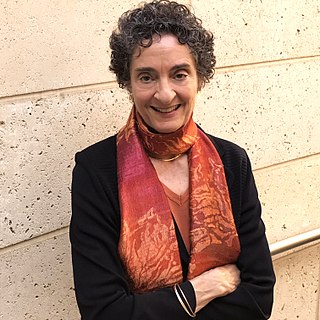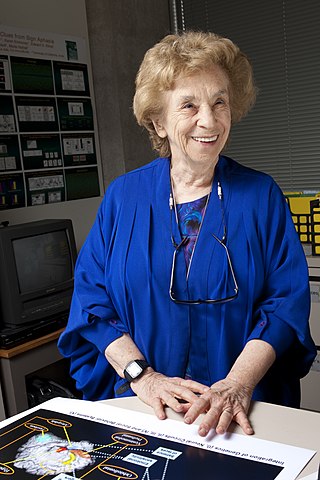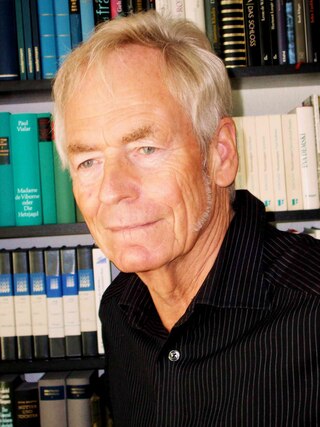Related Research Articles

Mark A. Nordenberg is the chancellor emeritus of the University of Pittsburgh and chair of the university's Institute of Politics. A professor of law and university administrator, Nordenberg served as the seventeenth Chancellor of the University of Pittsburgh from 1996 to 2014. Nordenberg served as the Dean of the University of Pittsburgh School of Law between 1985 and 1993 and other various administrative positions before becoming interim Chancellor of the University of Pittsburgh in 1995, a position which became permanent the following year. He became known as Nordy to many Pitt students, who voted to name a recreation center and arcade in the William Pitt Union as Nordy's Place, and is also the namesake of the university's endowed Nordenberg Scholarships and the Nordenberg Hall dormitory on the university's campus.

Carla J. Shatz is an American neurobiologist and an elected member of the American Academy of Arts and Sciences, the American Philosophical Society, the National Academy of Sciences, and the National Academy of Medicine.

George F. Koob is a Professor and former Chair of the Committee on the Neurobiology of Addictive Disorders at the Scripps Research Institute and Adjunct Professor of Psychology, Psychiatry, and Skaggs School of Pharmacy and Pharmaceutical Sciences at the University of California, San Diego. In 2014 he became the director of the National Institute on Alcohol Abuse and Alcoholism.

W. Edward Sell was the Dean of the University of Pittsburgh School of Law from 1966 through 1977.

Eve Marder is a University Professor and the Victor and Gwendolyn Beinfield Professor of Neuroscience at Brandeis University. At Brandeis, Marder is also a member of the Volen National Center for Complex Systems. Dr. Marder is known for her pioneering work on small neuronal networks which her team has interrogated via a combination of complementary experimental and theoretical techniques.

Ursula Bellugi was an American cognitive neuroscientist. She was a Distinguished Professor Emerita and director of the Laboratory for Cognitive Neuroscience at the Salk Institute in La Jolla, California. She is known for research on the neurological bases of American Sign Language and language representation in people with Williams Syndrome.

Jörg-Peter Ewert is a German neurophysiologist and researcher in the field of Neuroethology. From 1973 to 2006, he served as a university professor in the Faculty of Natural Sciences at the University of Kassel, Germany.

Anne Buckingham Young is an American physician and neuroscientist who has made major contributions to the study of neurodegenerative diseases, with a focus on movement disorders like Huntington's disease and Parkinson's disease. Young completed her undergraduate studies at Vassar College and earned a dual MD/PhD from Johns Hopkins Medical School. She has held faculty positions at University of Michigan and Harvard University. She became the first female chief of service at Massachusetts General Hospital when she was appointed Chief of Neurology in 1991. She retired from this role and from clinical service in 2012. She is a member of many academic societies and has won numerous awards. Young is also the only person to have been president of both the international Society for Neuroscience and the American Neurological Association.

The Hutton Honors College is the honors program of Indiana University Bloomington. The college was founded as the University Honors Division in 1966 with Warner Chapman as its director. It was renamed the Hutton Honors College in the fall of 2004 in honor of IU alumnus Edward L. Hutton. Its purpose serves to bring together students of various disciplines in an intellectually engaging manner, through research, creative projects, seminars, extracurricular activities, rigorous academics, travel abroad, and internships.
Norman Tenner Adler through his research, teaching, writing, and academic administration, made major contributions to the modern study of biological psychology and in American higher education, having helped develop the fields that are now labeled behavioral neurobiology and evolutionary psychology. One of Adler's prominent experiments included an in depth analysis of mating performance of male rats and its relation to fertilization in the female, which led him to observe how behaviour could affect reproduction in species. With his students and colleagues, he has worked at the interface between biology and behavior. They have stressed the importance of combining the study of physiological mechanisms controlling behavior with the functional/adaptive significance of behavior in an evolutionary context. He was influenced in this approach by his undergraduate teachers at Harvard, especially Paul Rozin, Jerry Hogan, and Gordon Bermant, and his student colleagues like Don Pfaff with whom he has maintained scientific relationships over the years. His research was also impacted by Daniel Lehrman, and he worked closely with Lehrman's student, Barry Komisaruk, on hormones and neural functioning. Adler is also a prominent figure in American higher education, especially the role of behavioral neuroscience in liberal arts education and religion in the college classroom. He participated in Phillip Zimbardo's PBS TV series Discovering Psychology, one of the first distance-learning courses in psychology.
Bernice Grafstein Shanet is a Canadian neurophysiologist, a professor at Weill Cornell Medical College in New York and a noted specialist in neuroregeneration research. Shanet is a Professor of Physiology and Biophysics at Weill Cornell Medical College, the holder of the Vincent and Brooke Astor Distinguished Professorship in Neuroscience at Weill Cornell Medical College, the Professor of Neuroscience for the Brain and Mind Research Institute at Weill Cornell Medical College and the first woman ever to serve as president of the American Society for Neuroscience. Shanet is famous for her studies of the transport of materials down the axon nerves and her thesis work on the mechanism of cortical spreading depression, which became a classic in its field and is acknowledged even today.
Elspeth McLachlan, an Australian neuroscientist, is a world authority on neural pathways within the autonomic nervous system. Her work has included detailed analyses of transmission in autonomic ganglia to studies of the organisation of autonomic nervous pathways and their disorder in pathological states, particularly injuries to peripheral nerves and the spinal cord.

Douglas G. McMahon is a professor of Biological Sciences and Pharmacology at Vanderbilt University. McMahon has contributed several important discoveries to the field of chronobiology and vision. His research focuses on connecting the anatomical location in the brain to specific behaviors. As a graduate student under Gene Block, McMahon identified that the basal retinal neurons (BRNs) of the molluscan eye exhibited circadian rhythms in spike frequency and membrane potential, indicating they are the clock neurons. He became the 1986 winner of the Society for Neuroscience's Donald B. Lindsley Prize in Behavioral Neuroscience for his work. Later, he moved on to investigate visual, circadian, and serotonergic mechanisms of neuroplasticity. In addition, he helped find that constant light can desynchronize the circadian cells in the suprachiasmatic nucleus (SCN). He has always been interested in the underlying causes of behavior and examining the long term changes in behavior and physiology in the neurological modular system. McMahon helped identifying a retrograde neurotransmission system in the retina involving the melanopsin containing ganglion cells and the retinal dopaminergic amacrine neurons.

Dimitri Michael Kullmann is a British neurologist who is a professor of neurology at the UCL Institute of Neurology, University College London (UCL), and leads the synaptopathies initiative funded by the Wellcome Trust. Kullmann is a member of the Queen Square Institute of Neurology Department of Clinical and Experimental Epilepsy and a consultant neurologist at the National Hospital for Neurology and Neurosurgery.

Stephen Andrew Maren is an American behavioral neuroscientist investigating the brain mechanisms of emotional memory, particularly the role context plays in the behavioral expression of fear. He has discovered brain circuits regulating context-dependent memory, including mapping functional connections between the hippocampus, prefrontal cortex, and amygdala that are involved in the expression and extinction of learned fear responses.
Michael. J. Zigmond is an American neuroscientist. He is emeritus Professor of Neurology at University of Pittsburgh since 2017, previously Professor of Neurology, Psychiatry, and Pharmacology, and Editor-in-Chief of Elsevier's Progress in Neurobiology. He is an Elected Fellow, since 2009, of the American Association for the Advancement of Science. His interests include neuroprotection and neuroplasticity, health aging, and Parkinson's disease. Since 2011, he has also served as Distinguished International Professor at Fudan University.
Julie A. Fiez is a cognitive neuroscientist known for her research on the neural basis of speech, language, reading, working memory, and learning in healthy and patient populations. She is Professor of Psychology and Neuroscience at the Learning Research and Development Center and the Center for the Neural Basis of Cognition at the University of Pittsburgh. She is also Adjunct Faculty in the Department of Psychology at Carnegie Mellon University.
Mary Louise Phillips is a Distinguished Professor in Psychiatry and Clinical and Translational Science, a Pittsburgh Foundation Emmerling Endowed Chair in Psychotic Disorders, Director of the Center for Neural Circuit-Based Technology Interventions in Psychiatry and the Center for Research in Translational and Developmental Affective Neuroscience, Director of the Collaborative on Mood Disorders Research, and Director of the Mood and Brain Laboratory - Department of Psychiatry, University of Pittsburgh. As the director of the Mood and Brain Laboratory, Phillips performs neuroimaging research designed to elucidate the neuropathophysiological basis of bipolar disorders and associated behavioral traits.

Pierre J. Magistretti is an Italian and Swiss neuroscientist and physician. He is a professor emeritus of neuroscience at EPFL, University of Geneva and University of Lausanne. Until 2012, he was the director of the EPFL's Brain Mind Institute and director of the Center for Psychiatric Neuroscience of the University of Lausanne and Lausanne University Hospital. Since 2012 he has been distinguished professor at King Abdullah University of Science and Technology where he was dean of the division of biological and environmental sciences and engineering between 2012 and 2020.
Johanna Michelle Montgomery is a New Zealand academic, and is professor of physiology at the University of Auckland, specialising in synaptic plasticity in brain cells. She also works on nerve cells in the heart associated with atrial fibrillation.
References
- ↑ "Edward M. Stricker, Ph.D." Department of Neuroscience. University of Pittsburgh. Retrieved 2018-09-13.
- ↑ Alexa Bakalarski (June 21, 2016). "Edward Stricker steps down as Honors College dean". The Pitt News. Retrieved 2018-09-13.
- 1 2 Danielewski, Mike (16 June 2016). "Pitt University Honors College dean to return to teaching". Pittsburgh Post-Gazette. Retrieved 1 December 2018.
- ↑ Stricker, Edward M; Verbalis, Joseph G (1988). "Hormones and behavior: The biology of thirst and sodium appetite". American Scientist . 76 (3). Sigma Xi: 261–267. JSTOR 27855183.
- ↑ Zigmond, Michael J; Abercrombie, Elizabeth D; Berger, Theodore W; Grace, Anthony A; Stricker, Edward M (July 1990). "Compensations after lesions of central dopaminergic neurons: some clinical and basic implications". Trends in Neurosciences . 13 (7): 290–296. doi:10.1016/0166-2236(90)90112-N. ISSN 0166-2236. PMID 1695406.
- ↑ Stricker, Edward M (2016). "2015 Distinguished career award: Reflections on a career in science". Physiology & Behavior . 162: 196–200. doi:10.1016/j.physbeh.2015.09.028. PMC 4955950 . PMID 26434784.